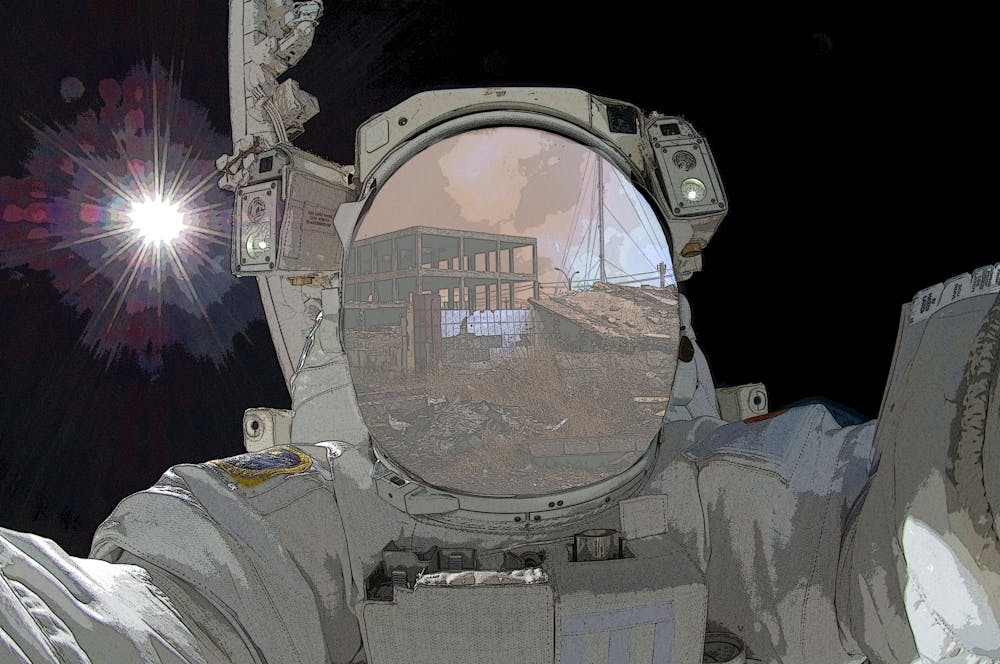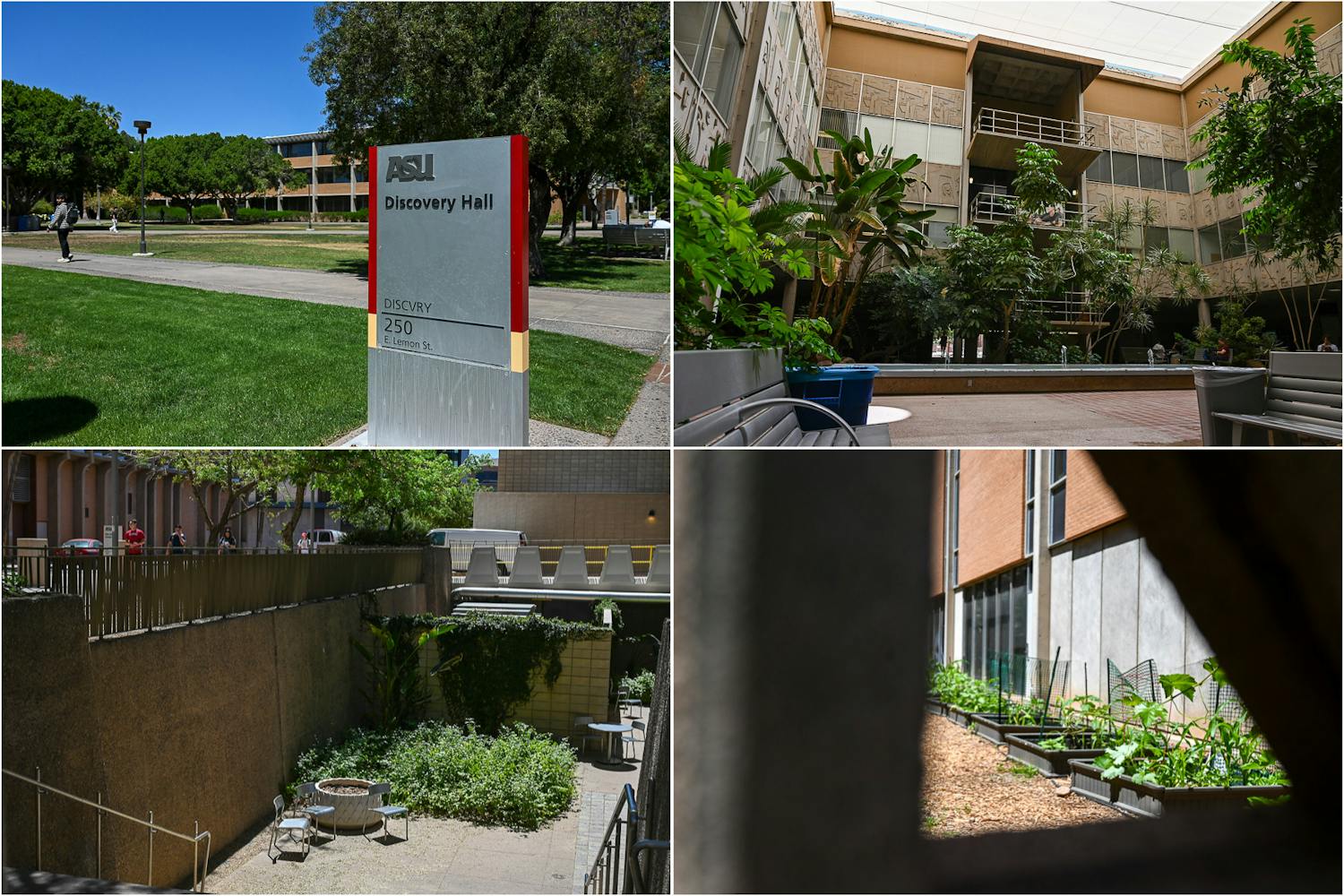The environmental structures that allow Earth to sustain life — glaciers, oceans, rainforests — are quickly deteriorating at a rate not seen since the last mass extinction that killed 76% of all species on Earth.
Since 1900, nearly 500 species of animals have gone extinct, and the further destruction of ecosystems only brings us closer to seeing homo sapiens added to the list.
The U.N. climate change executive secretary, Patricia Espinosa, estimates that we only have 11 years before we reach a point of no return with our carbon dioxide emissions. The biggest challenge of this generation, and the next century, will be our ability to mitigate the effects of climate change.
The Center for Science and the Imagination at ASU is taking an eccentric approach to finding solutions to climate change. Their Imagination and Climate Futures Initiative uses works of fiction to place mental images of the effects of climate change in the minds of their readers.
Klaus Lackner, director of the Center for Negative Carbon Emissions, said because people can’t visualize the effects they have on the environment, they aren’t acting on solutions that could help save it.
Lackner said he recently handed people bags full of sand meant to represent the carbon emissions coming out of their vehicles by the mile. By handing them an object they could see and feel, the people were able to visualize the immediate impact their cars are having on the environment.
Movies or science fiction pieces help people imagine these solutions and play a crucial role in combating climate change by inspiring the populace to imagine new solutions. They also visualize what might happen in the future.
For example, “Star Trek” inspired Martin Cooper to invent the first mobile phone.
This ability to visualize new ideas is what experts at ASU say is crucial for our future on this planet.
Manjana Milkoreit, an assistant professor at Purdue University, established the initiative at ASU in 2014 to not only imagine new solutions, but to also open the discussion about climate change to the general public and their role in combating it.
As the current editor and program manager for the Center for Science and the Imagination, Joey Eschrich said imagination is something everybody possesses.
“It's not as if some people are born incredibly imaginative and the rest of us are born with very little imagination. It's more like some people are encouraged to embrace and develop their imagination and be expansive ... And then some people are not encouraged that way … especially when they're young,” Eschrich said.
“When you get into a career or a profession … you're encouraged to not necessarily question how things are working and exercise your critical faculties as much.”
In addition, he said that another part of what stagnates imagination is the way society prioritizes short-term thinking and the pursuit of goals that can be measured.
Eschrich is carrying on Milkoreit’s legacy. His role at the center is to work with science fiction authors and, “create visions of the future that are not only inspiring and inclusive, but also grounded in real science and technology.”
The initiative currently has a bi-annual publication called “Everything Change." The title comes from a quote by Margaret Atwood, “I think calling it 'climate change' is rather limiting, I’d rather call it 'the everything change.'”
One of the goals of the initiative is to invite people from all over the world to submit fictional stories about how they imagine climate change will impact our future.
“Hopefully, literature is a way to kind of see and help people feel more enfranchised and invite them into the conversation,” Eschrich said.
Leah Newsom, the outreach coordinator for the Arizona Center for Medieval and Renaissance Studies, wrote “Orphan Bird” which is published in the second edition of “Everything Change.”
READ MORE: Student's climate fiction story looks at environmental issues through a human lens
Newsom was inspired to write the piece because she was thinking about the Salton Sea in Southern California, and she imagined a world where that sea had completely dried up due to the damming of the Colorado River.
Newsom said fiction helps people understand climate change because it’s relatable at a human level.
“It's not just like a nonfiction article that's telling you about the state of things or how things may look in the future ... It's feeling and experience. It digs deep in your bones,” Newsom said. “What we're seeing is really persuasive artistic, innately human ways of approaching (climate change) like a very great concept that is otherwise quite hard to understand.”
Climate change is an obstacle humanity faces, so the initiative is hoping to empower everyday people, not just scientists, to take action.
“We want people to feel like they're not powerless because if everybody feels powerless ... that can lead to inaction,” Eschrich said.
Even over-the-top, imaginative ideas, Lackner said, such as Elon Musk’s goal of terraforming Mars, are important and needed to help our fight against climate change.
“Keep in mind that you probably would leave quite a few people behind ... Mars is a little smaller than Earth,” Lackner said. “We need to imagine, A) what could happen, and B) what kind of solutions would be possible … No matter how you look at it, you're making predictions about the future and therefore you need to have some imagination of what could happen.”
Although Lackner and the staff of the Center for Science and the Imagination drive the inherent value of imagination, one of the criticisms that Eschrich and his colleagues are on guard for is optimism turning into irrational confidence about the future.
"(It’s not enough) to say we can just tell a story and everything will be different, or we can just imagine a better future and somehow that'll materialize,” Eschrich said.
He believes humanity can’t sit back and hope a wave of human progress will miraculously solve our problems, and it is important to show people how technologies can be used (and how they are used) “with a good science fiction story.”
Lackner and Eschrich both believe that imagination is essential to finding ways to combat climate change. They believe more people who don’t have degrees in climate science should contribute to the conversation because climate change will affect everyone.
“People can know enough, and they do know enough, to have an opinion on this stuff and have a voice in this conversation. You don't need special credentials to be allowed to have a voice. We all need to be active on climate,” Eschrich said.
Reach the reporter at aegould3@asu.edu or follow @aegould3 on Twitter.
Like State Press Magazine on Facebook and follow @statepressmag on Twitter.

Alex Gould is one of the editors of the photo desk. He is also currently working with The Arizona Republic as an intern photographer, Cronkite News as a visual journalist and working on assets for Arizona PBS.




